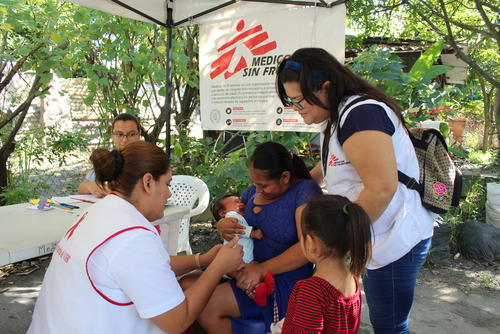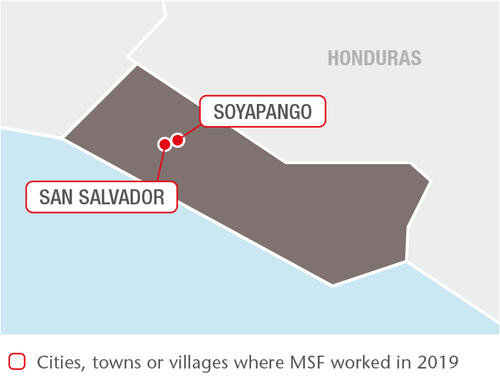
11,300
11,3
3,030
3,03
1,130
1,13

71
71
El Salvador is ranked among the countries with the highest homicide rates in the world: 36 per 100,000 inhabitants in 2019, according to the police. Gang violence and conflict with security forces have created humanitarian consequences and affected access to healthcare.
Unable to move freely between neighbourhoods in areas dominated by rival gangs, people struggle to access health services. In some ‘red zones’, the Ministry of Health has suspended services due to violence and threats.
In 2019, as part of our health promotion and community-strengthening activities, we formed six health committees in neighbourhoods in San Salvador and Soyapango, a nearby city. These committees were then able to liaise directly with the Ministry of Health to provide care.
In response to the community work of our health promotion team, the health committees also developed activities with local authorities to promote healthy habits and disease prevention. Water disinfection, sanitation campaigns, prevention of mosquito-borne diseases and first-aid training were among these activities.
MSF also collaborated with the Ministry of Health to facilitate access to communities perceived as dangerous, where they were unable to provide medical care and health promotion. As a result, vaccination and sexual and reproductive health services resumed and we were able to provide mental health services in medical facilities.
In partnership with the Emergency Medical System (a national ambulance service) and Rescue Corps (an association of volunteers), we continued to operate emergency and ambulance services in Soyapango. These enabled over 1,650 urgent referrals to be made from communities where healthcare is unavailable. MSF also started evaluating the extension of services to the nearby city of Ilopango.
In addition, we collaborated with state-run institutions and other NGOs to provide aid and shelter to migrants, as well as deported and displaced people. We responded to the medical and mental health needs of 2,284 people.
In El Salvador, one in six women were victims of sexual violence in 2019. MSF gave mental health assistance to 71 victims of sexual violence. In addition, our social workers and medical teams worked with people affected by the murder or forced disappearance of family members, as well as those threatened or at risk of being forcibly recruited by gangs – all of them in need of protection.
MSF also advocated safe access to allow our staff to work in areas where violence is endemic.
During 2019, we ran approximately 7,100 community activities and MSF’s mobile clinics conducted around 10,500 medical consultations and more than 2,900 sexual and reproductive health consultations in El Salvador.

















